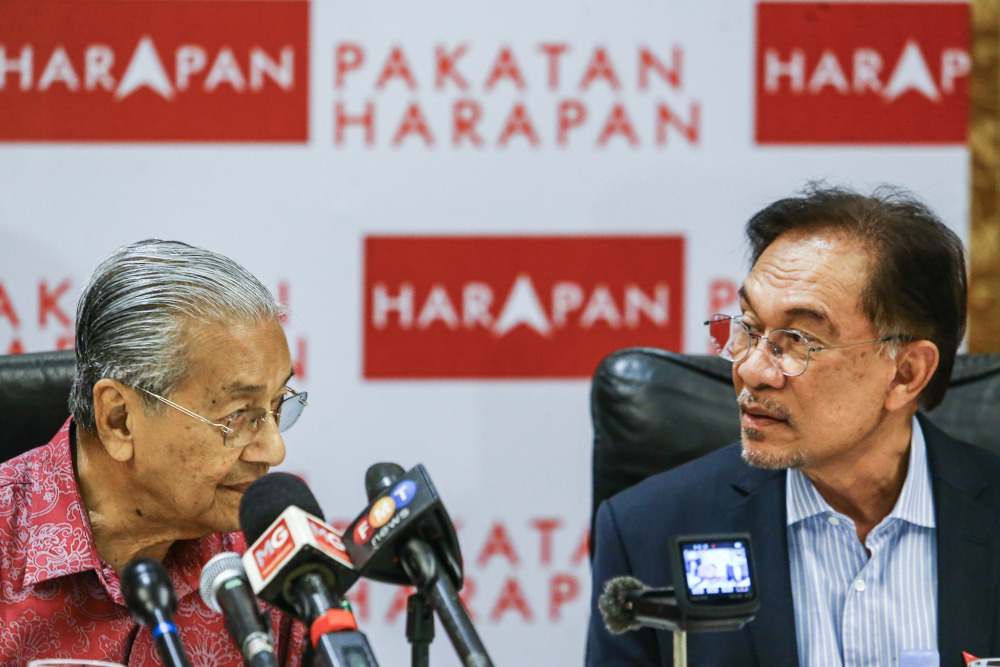KUALA LUMPUR, Dec 2 — In times of crisis lies opportunity.
With that in mind, political analysts feel Datuk Seri Anwar Ibrahim may yet benefit from public frustration with the ruling Pakatan Harapan (PH) coalition with its many policy blunders and lacklustre performance that have ignited calls for a leadership change.
For the PKR president, the ruling coalition’s flagging public support provides a silver lining amid uncertainties over his status as prime minister-in-waiting, as speculation remains that certain influential forces within the coalition are still campaigning against his ascension.
With public confidence toward the current leadership at its lowest since PH took power in May 2018, observers said it is possible that voter sentiment has shifted significantly to favour Anwar, who is now viewed as the coalition’s likely saviour.
“He has the credentials as a reformist and is seen as someone having so much experience,” said Jeniri Amir, a political analyst with Universiti Malaysia Sarawak.
“And given the current state of things — the division, intrigues and infighting — having Anwar take over will provide certainty.”
Political analysts said PH’s drubbing in the Tanjung Piai parliamentary by-election earlier this month marked a new low for the ruling coalition’s approval rating, as wary voters used the ballot box to vent against what they saw as a dysfunctional government plagued by infighting.
While the Umno-PAS consolidation may have helped Barisan Nasional (BN) secure an overwhelming number of the constituency’s Malay votes, the by-election also saw Chinese minorities, long thought to be PH’s “safe deposit”, voting for rivals BN in droves.
Chinese support for BN during the Tanjung Piai polls was said to be at a level not seen since before 2008.
Political analysts believed the Chinese vote swing was mainly driven by protest against Bersatu, PH’s Malay component party, whose leaders were behind some of the controversial policies that incensed many in the community, such as the teaching of jawi in vernacular schools.
Critics claimed these policies are politically driven and aimed at helping the party widen its Malay base, an allegation Bersatu leaders have denied.
Oh Ei Sun, senior fellow at the Singapore Institute of International Affairs, predicted it is within this tension that Anwar can shine most.
With increasing suspicion that Bersatu has turned to ethnic politics for support, Anwar is given the chance to furbish his standing among ethnic Chinese by pushing for what Oh called “lofty colour-blind policies”.
“At the moment, Dr Mahathir is indeed perceived to be indulging his party members or well-known associates to wallow in all sorts of political and ideological antics, which are at the least laughable, and at worst, detrimental to national development as a whole,” he said, referring to incumbent Prime Minister Tun Dr Mahathir Mohamad.
“Seen in that light, Anwar’s comparatively lofty calls at the moment of colour-blind policies are, of course, more attractive.”
The electoral loss and concerns over PH’s eroded support has since fuelled calls for a leadership change.
In the aftermath of the defeat, Dr Mahathir who is also PH chairman, said he is willing to take the blame and step down if there is consensus, only to have Anwar rejecting the idea.
But further down the coalition’s ranks there are already murmurs calling for a power transition to be sped up, although it remains confined within factions supportive of Anwar for now.
Nevertheless, it has fuelled speculation that the latter could use it to exert pressure on Dr Mahathir and force his early departure.
Sivamurugan Pandian, political analyst with Universiti Sains Malaysia, said Anwar’s popularity “may” be going up, but added that the latter “may also want to be extra cautious not to repeat 1998 saga”.
For now, Anwar had said he remains firmly behind Dr Mahathir, the man who sacked him as deputy prime minister in 1998 to trigger one of the country’s most volatile political crisis.
The former had repeatedly expressed faith in Dr Mahathir’s leadership and that the PH chairman would honour his pledge to make way, even as rumours mount that factions in Bersatu or even PKR are conspiring to block the succession.
In a survey by Ilham Centre earlier this year, Anwar’s rating as the most credible successor to Dr Mahathir topped other notable leaders, including Bersatu president Tan Sri Muhyiddin Yassin and PKR deputy president Datuk Seri Azmin Ali.
The think tank’s researcher Mohd Azlan Zainal said Anwar’s succession was among the galvanising factors that helped put PH in power, and that the coalition will likely see the power transition through despite having no timeline fixed.
Ilham Centre’s survey held during the Tanjung Piai by-election also found the uncertainty over the succession plan to be a key concern among voters there, he added.
“When the time comes, the two-year tenure accorded to Mahathir as prime minister will likely be reviewed based on need, priorities, importance and rational consideration among component members,” he told Malay Mail.
“This power-sharing deal will be the binding force on Mahathir and the entire leadership even if there are efforts by individuals or movements, be it internal or external, to foil the succession plan.”



















